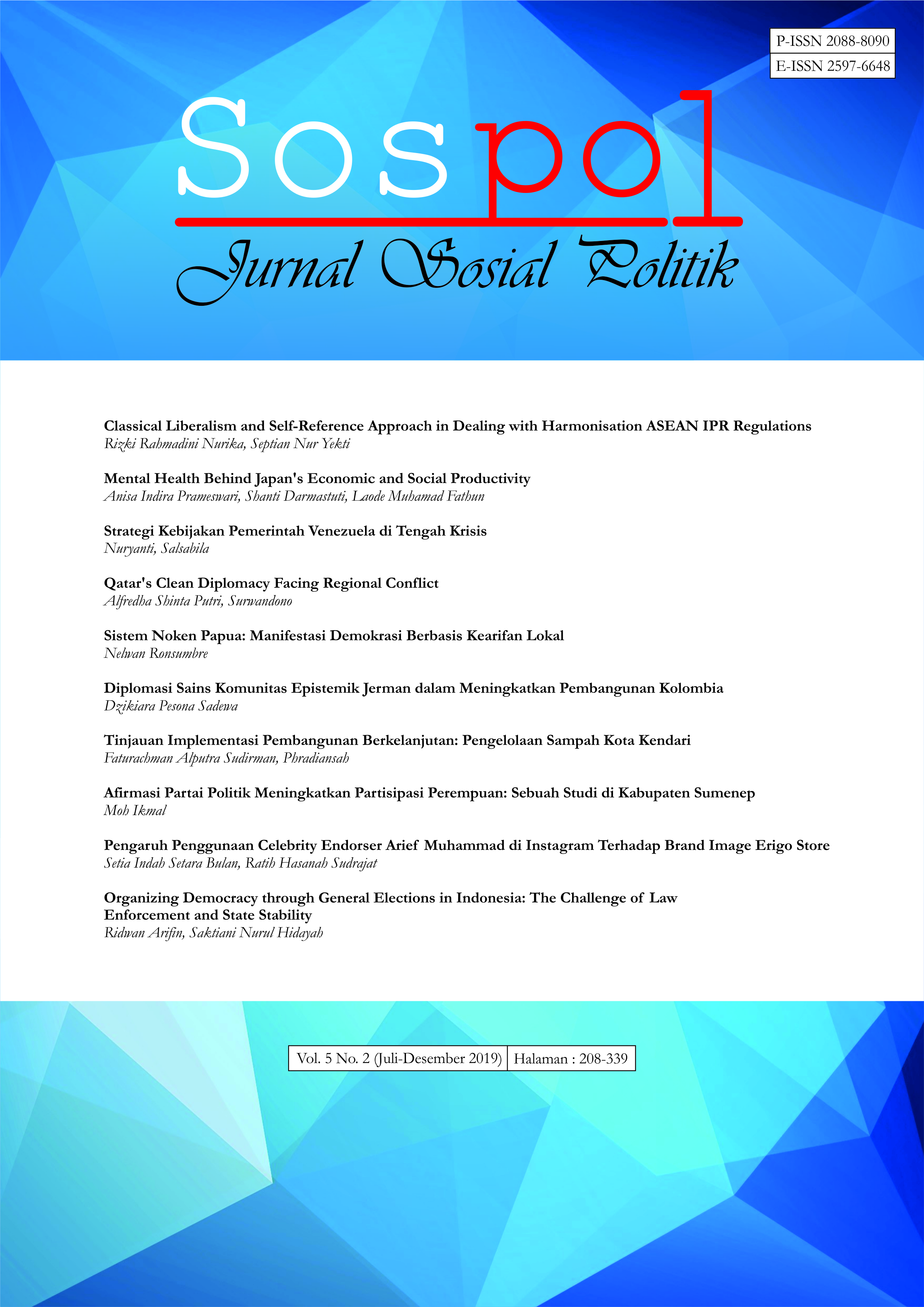Qatar's Clean Diplomacy Facing Regional Conflict
DOI:
https://doi.org/10.22219/sospol.v5i2.10035Keywords:
Clean Diplomacy, Conflict, Foreign Policy, QatarAbstract
Qatar is one of the richest countries in the Middle East region. Qatar is able to supply the third largest gas to the world and become the third largest exporter of liquid natural gas. This paper is interested in analyzing the behavior of the Qatari government amid various conflicts and tensions in the Middle East region. Qatar tends to position itself as a mediator of conflict. The Qatari government believes that by being a mediator in this conflict it can be a neutral position.Qatari governance is based on the basic norm structure that is used as a policy platform, and articulates it openly, with integrity, and is measurable. This is known as clean diplomacy. Qatar manages the crisis by remaining consistent with its image as a guardian of regional peace and stability. The image of Qatar as an 'honest broker' country is able to increase Qatar's legitimacy in the international public arena. This paper builds on arguments based on secondary document data, and interprets the data with a qualitative approach to understanding Qatar's foreign policy behavior. The analysis showed that the choice of governance of Qatar's clean diplomacy proved effective in managing the foreign political pressure of neighboring countries in the form of not escalating conflict, and Qatar's political and economic stability.
Downloads
References
Amini, A., & Akbarsefat, M. (2016). Qatar’s Modern Diplomacy and Al-Jazeera’s Role in Middle East’s Evolutions over the Recent Decades. Journal of Sociological Research, 7(1), 123–137. https://doi.org/10.5296/jsr.v7i1.9580
Blanchard, C. M. (2014, November 4). Qatar: Background and U.S. Relations. Congrrssional Research Service. Retrieved from https://fas.org/sgp/crs/mideast/RL31718.pdf
Chong, A. (2006). Singapore’s foreign policy beliefs as “Abridged Realism”: Pragmatic and liberal prefixes in the foreign policy thought of Rajaratnam, Lee, Koh, and Mahbubani. International Relations of the Asia-Pacific, 6(2), 269–306. https://doi.org/10.1093/irap/lci137
Felsch, M. (2016). Qatar’s Rising International Influence: A Case of Soft Power? Conjuntura Internacional, 13(1), 22–35. https://doi.org/10.5752/p.1809-6182.2016v13n1p22
Gabriel, J. M., & Fischer, T. (2003). Swiss foreign policy, 1945-2002. Palgrave Macmillan.
Harlow, W. F. (2017). Strategic Silence as a Frame for Understanding the 2017 Embargo Against Qatar. Journal of Contemporary Rhetoric (Vol. 7). Retrieved from http://gulfnews.com/news/uae/uae-supports-statements-of-bahrain-and-saudi-arabia-on-qatar-1.2038529
Himes, A. (2018). Competing visions for a modern emirate: The government centre of the state of Qatar. International Journal of Islamic Architecture. https://doi.org/10.1386/ijia.7.1.143_1
Jones, M. O., Lynch, M., Roberts, D., & Diwan, K. S. (2017). The Qatar Crisis. Project on Middle East Political Science (POMEPS) Briefings. Retrieved from https://pomeps.org/wp-content/uploads/2017/10/POMEPS_GCC_Qatar-Crisis.pdf
Kamrava, M. (2011). Mediation and Qatari Foreign Policy. Middle East Journal, 65(4), 539–556.
Leifer, M. (2000). Singapore’s Foreign Policy, Coping with Vulnerability. New York: Routledge.
Lian Kwen Fee. (2001). The construction of Malay identity across nations Malaysia, Singapore, and Indonesia. Bijdragen Tot de Taal-, Land- En Volkenkunde / Journal of the Humanities and Social Sciences of Southeast Asia, 157(4), 861–879. https://doi.org/10.1163/22134379-90003795
Low, L. (2002). Globalisation and the Political Economy of Singapore’s Policy on Foreign Talent and High Skills. Journal of Education and Work, 15(4), 409–425. https://doi.org/10.1080/1363908022000023551
Miller, R. (2019). Managing Regional Conflict: The Gulf Cooperation Council and the Embargo of Qatar. Global Policy, 10(S2), 36–45. https://doi.org/10.1111/1758-5899.12674
Miller, R., & Verhoeven, H. (2019). Overcoming smallness: Qatar, the United Arab Emirates and strategic realignment in the Gulf. International Politics, 20(98), 1–20. https://doi.org/10.1057/s41311-019-00180-0
Mitchell, J. S. (2014). Book Review Qatar: small state, big politics. Democratization, 21(4), 771–773. https://doi.org/10.1080/13510347.2013.876994
Nuruzzaman, M. (2015). Gulf Cooperation Council (GCC), Qatar and dispute mediations: a critical investigation. Contemporary Arab Affairs, 8(4). https://doi.org/10.1080/17550912.2015.1078073
Samuel-Azran, T. (2013). Al-Jazeera, Qatar, and New Tactics in State-Sponsored Media Diplomacy. American Behavioral Scientist, 57(9), 1293–1311. https://doi.org/10.1177/0002764213487736
Ulrichsen, K. C. (2014). Qatar and the Arab Spring: Policy Drivers and Regional Implications (September 2014). Carnegie Endowment for International Peace. Retrieved from https://carnegieendowment.org/files/Brief-Ulrichsen_Qatar.pdf
Warsito, T., & Surwandono, . (2015). “Diplomasi Bersih” Dalam Perspektif Islam. THAQAFIYYAT: Jurnal Bahasa, Peradaban Dan Informasi Islam, 16(2), 145–176. Retrieved from http://ejournal.uin-suka.ac.id/adab/thaqafiyyat/article/view/627/pdf_32
Zafirov, M. (2017). The Qatar Crisis—Why the Blockade Failed. Israel Journal of Foreign Affairs, 11(2), 191–201. https://doi.org/10.1080/23739770.2017.1382072
Downloads
Published
How to Cite
Issue
Section
License
Authors who publish with this journal agree to the following terms:
- Authors retain copyright and grant the journal right of first publication with the work simultaneously licensed under a Creative Commons Attribution-ShareAlike 4.0 International License that allows others to share the work with an acknowledgement of the work's authorship and initial publication in this journal.
- Authors are able to enter into separate, additional contractual arrangements for the non-exclusive distribution of the journal's published version of the work (e.g., post it to an institutional repository or publish it in a book), with an acknowledgement of its initial publication in this journal.
- Authors are permitted and encouraged to post their work online (e.g., in institutional repositories or on their website) prior to and during the submission process, as it can lead to productive exchanges, as well as earlier and greater citation of published work (See The Effect of Open Access).

This work is licensed under a Creative Commons Attribution-ShareAlike 4.0 International License.









